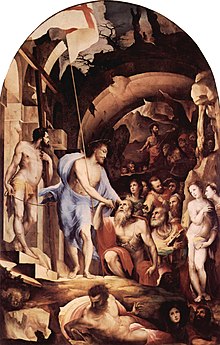
Back Limbo Afrikaans ليمبو Arabic Лимбо Bulgarian Llimbs Catalan Limbus (náboženství) Czech Limbo Danish Limbus (Theologie) German Limbo (religio) Esperanto Limbo (teología) Spanish Linbo (teologia) Basque
This article is written like a personal reflection, personal essay, or argumentative essay that states a Wikipedia editor's personal feelings or presents an original argument about a topic. (September 2023) |

| Part of a series on the |
| Catholic Church |
|---|
 |
| Overview |
|
|
In Catholic theology, Limbo (Latin: limbus, 'edge' or 'boundary', referring to the edge of Hell) is the afterlife condition of those who die in original sin without being assigned to the Hell of the Damned. However, it has become the general term to refer to nothing between time and space in general. Medieval theologians of Western Europe described the underworld ("hell", "hades", "infernum") as divided into three distinct parts: Hell of the Damned,[1] Limbo of the Fathers or Patriarchs, and Limbo of the Infants. The Limbo of the Fathers is an official doctrine of the Catholic Church, but the Limbo of the Infants is not.[2] The concept of Limbo comes from the idea that, in the case of Limbo of the Fathers, good people were not able to achieve heaven just because they were born before the birth of Jesus Christ. This is also true for Limbo of the Infants in that simply because a child died before baptism, does not mean they deserve punishment, though they cannot achieve salvation.
- ^ Catholic Encyclopedia: Hell: "However, in the New Testament the term Gehenna is used more frequently in preference to hades, as a name for the place of punishment of the damned. [...] held in abomination by the Jews, who, accordingly, used the name of this valley to designate the abode of the damned (Targ. Jon., Gen., iii, 24; Henoch, c. xxvi). And Christ adopted this usage of the term." Jewish Encyclopedia: Gehenna: Sin and Merit: "It is frequently said that certain sins will lead man into Gehenna. The name "Gehenna" itself is explained to mean that unchastity will lead to Gehenna (; 'Er. 19a); so also will adultery, idolatry, pride, mockery, hypocrisy, anger, etc. (Soṭah 4b, 41b; Ta'an. 5a; B. B. 10b, 78b; 'Ab. Zarah 18b; Ned. 22a)."
- ^ "CATHOLIC ENCYCLOPEDIA: Limbo". www.newadvent.org. Retrieved 16 September 2022.